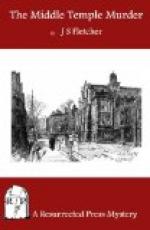The Coroner turned to Aylmore.
“Do you object to that?” he asked.
Aylmore stepped boldly forward and into the box.
“I object to nothing,” he said in clear tones, “except to being asked to reply to questions about matters of the past which have not and cannot have anything to do with this case. Ask me what questions you like, arising out of the evidence of the last two witnesses, and I will answer them so far as I see myself justified in doing so. Ask me questions about matters of twenty years ago, and I shall answer them or not as I see fit. And I may as well say that I will take all the consequences of my silence or my speech.”
The Treasury Counsel rose again.
“Very well, Mr. Aylmore,” he said. “I will put certain questions to you. You heard the evidence of David Lyell?”
“I did.”
“Was that quite true as regards yourself?”
“Quite true—absolutely true.”
“And you heard that of the last witness. Was that also true!”
“Equally true.”
“Then you admit that the evidence you gave this morning, before these witnesses came on the scene, was not true?”
“No, I do not! Most emphatically I do not. It was true.”
“True? You told me, on oath, that you parted from John Marbury on Waterloo Bridge!”
“Pardon me, I said nothing of the sort. I said that from the Anglo-Orient Hotel we strolled across Waterloo Bridge, and that shortly afterwards we parted—I did not say where we parted. I see there is a shorthand writer here who is taking everything down—ask him if that is not exactly what I said?”
A reference to the stenographer proved Aylmore to be right, and the Treasury Counsel showed plain annoyance.
“Well, at any rate, you so phrased your answer that nine persons out of ten would have understood that you parted from Marbury in the open streets after crossing Waterloo Bridge,” he said. “Now—?”
Aylmore smiled.
“I am not responsible for the understanding of nine people out of ten any more than I am for your understanding,” he said, with a sneer. “I said what I now repeat—Marbury and I walked across Waterloo Bridge, and shortly afterwards we parted. I told you the truth.”
“Indeed! Perhaps you will continue to tell us the truth. Since you have admitted that the evidence of the last two witnesses is absolutely correct, perhaps you will tell us exactly where you and Marbury did part?”
“I will—willingly. We parted at the door of my chambers in Fountain Court.”
“Then—to reiterate—it was you who took Marbury into the Temple that night?”
“It was certainly I who took Marbury into the Temple that night.”
There was another murmur amongst the crowded benches. Here at any rate was fact—solid, substantial fact. And Spargo began to see a possible course of events which he had not anticipated.




